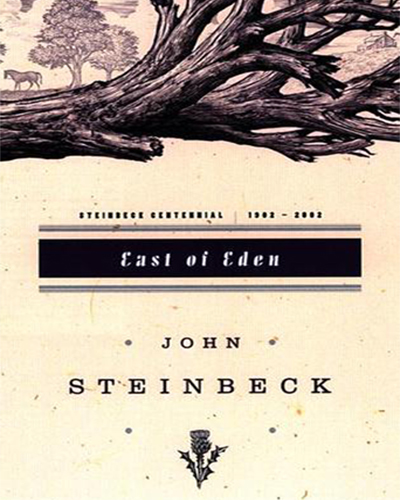
| Language | From $0.00 |
| Release Date | January 1, 1952 |
| Genre | Classics |
| Author | John Steinbeck |
| File Size | Penguin Books |
| Rating | (4.40) |
East of Eden is an epic tale that spans two generations of the Trask and Hamilton families, set against the backdrop of California’s Salinas Valley from the late 19th century to World War I. The story follows the lives of brothers Charles and Adam Trask, along with the cunning and manipulative Cathy Ames, who becomes entwined in their lives. As the narrative unfolds, the next generation of Trask children – Cal and Aron – must confront the same struggles between good and evil that haunted their father and uncle.
Charles is Adam Trask’s half-brother and a violent, troubled man who harbors jealousy and resentment toward his brother.
The protagonist of the novel, Adam seeks to escape his tumultuous past and build a life for himself and his family in the Salinas Valley.
A beautiful and manipulative woman, Cathy becomes entwined in the lives of both Charles and Adam, ultimately impacting the fate of the entire Trask family.
Adam’s son and Aron’s twin brother, Cal struggles with feelings of jealousy and worthlessness as he grapples with the concept of inherited sin.
Cal’s twin brother, Aron is the idealized, innocent counterpart to his darker sibling, yet he too must come to terms with the complexities of human nature.
A wise and compassionate friend to Adam, Samuel’s insights and guidance have a profound impact on the Trask family.
The Chinese-American servant of the Trask household, Lee’s wisdom and loyalty make him an essential figure in the lives of the Trask family.
The central theme of the novel, the battle between good and evil is explored through the story’s characters and their choices, as well as the biblical allusions to the story of Cain and Abel.
Throughout the novel, characters grapple with the concept of “timshel,” or “thou mayest,” the idea that individuals have the power to choose their own path in life, regardless of their inherited traits or circumstances.
East of Eden explores the impact of family relationships and the weight of carrying on a legacy, both in terms of inherited traits and family history.
Many characters in the novel are driven by a deep desire for love and acceptance, often leading them to make choices with far-reaching consequences.
Steinbeck’s unique storytelling style, which blends biblical allusions, rich descriptions of the California landscape, and complex character development, has established East of Eden as a classic of American literature.
The novel’s exploration of themes such as good vs. evil, choice, and the importance of family has resonated with readers for generations, cementing its place among other literary classics.
Despite being published in 1952, East of Eden continues to captivate modern readers with its exploration of timeless themes and complex characters.
The novel has been adapted into various forms, including a 1955 film starring James Dean, and continues to influence popular culture through its enduring story and memorable characters.